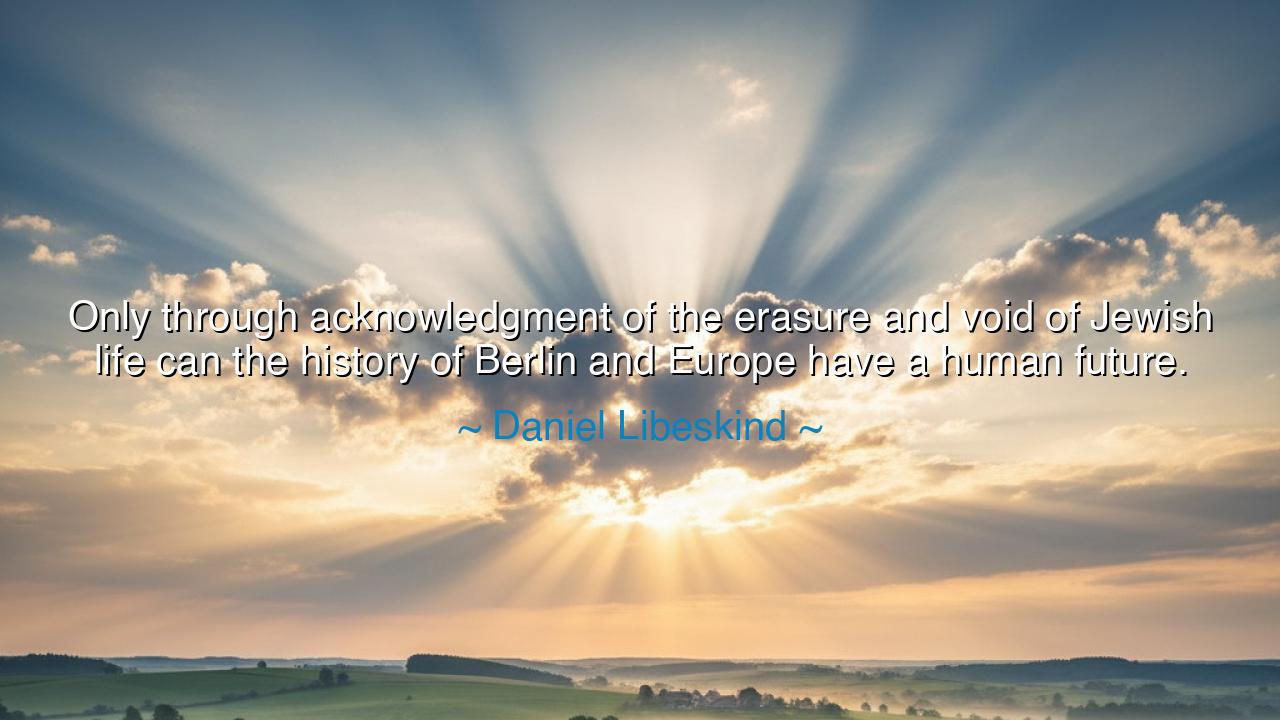
Only through acknowledgment of the erasure and void of Jewish
Only through acknowledgment of the erasure and void of Jewish life can the history of Berlin and Europe have a human future.






In the solemn corridors of memory, where silence speaks louder than words, Daniel Libeskind—architect, philosopher, and keeper of remembrance—proclaimed: “Only through acknowledgment of the erasure and void of Jewish life can the history of Berlin and Europe have a human future.” These words are not merely about architecture or art; they are a lamentation and a warning, a cry from the heart of history itself. Libeskind, whose Jewish Museum in Berlin rises like a wound turned into form, speaks of the moral architecture upon which civilization must stand. He reminds us that no future built upon denial can endure, and no culture can be called human unless it faces its own darkness with courage.
In the ancient traditions, the elders taught that the first step to healing is acknowledgment—to name the wound, to face what has been lost. Libeskind’s “void” is not only a space within his building; it is the emptiness left in the soul of Europe after the Holocaust, when six million voices were silenced, and with them, centuries of music, faith, learning, and light. The Jewish presence in Europe was not a shadow at the edge of civilization—it was one of its beating hearts. To erase it was to mutilate the very conscience of the continent. Thus, Libeskind declares that only by remembering the erasure, by giving form to the void, can Berlin and Europe reclaim their humanity.
The origin of this quote lies in Libeskind’s own act of creation: the design of the Jewish Museum in Berlin. Its walls slash across the city like a scar—its corridors jagged, its windows fractured, its “voids” deliberately empty. It is a building that refuses comfort. It forces those who walk within to feel absence, to confront the horror of silence. In doing so, it transforms architecture into testimony. The museum is not only about what was—it is about what was lost, and what remains unsaid. Libeskind’s philosophy is ancient in spirit: that remembrance is not decoration, but duty; that truth must be built not only in stone, but in soul.
History has shown us what happens when remembrance fails. After the fall of the Roman Empire, many civilizations tried to erase their predecessors, believing that forgetting would make them free. But only those who honored their past—like the scholars of the Renaissance, who resurrected lost knowledge—grew wise. So too, after the Second World War, there were those who wished to move on swiftly, to bury the pain of the Holocaust beneath progress. Yet every unacknowledged atrocity festers in the dark, breeding fear and ignorance anew. Libeskind’s words remind us that humanity cannot grow from denial; it must grow from truth. Just as the ancient prophets cried for repentance, so too must modern nations confess their sins if they wish to be reborn.
Think of Berlin, once the heart of the Nazi machine, now transformed into a city of remembrance. The Memorial to the Murdered Jews of Europe, the Topography of Terror, and Libeskind’s own museum stand not as monuments of guilt, but of conscience. They teach that remembrance is not an anchor dragging the living backward—it is a compass pointing toward moral renewal. The voids that Libeskind speaks of are not meant to paralyze, but to awaken. They are spaces where humanity can look into its own abyss and emerge wiser, humbled, and whole.
This quote, in its essence, speaks to the moral architecture of civilization. Every people, every nation, must one day face the voids it has created—the cultures it has silenced, the injustices it has ignored. The acknowledgment of erasure is not weakness; it is the highest act of strength. It is the moment when pride bows to truth, and healing begins. Just as the Japanese once rebuilt Hiroshima as a symbol of peace, or South Africa faced its past through its Truth and Reconciliation Commission, so must every society confront its ghosts to ensure they do not rise again.
So let this be the teaching carried into every generation: to forget is to forfeit humanity. The future cannot be built upon amnesia, but upon the courage to remember. The voids of history must be named, not hidden. The erasures must be spoken of, not ignored. And each of us, whether builder or witness, must become a keeper of memory—so that cruelty is not repeated, and compassion does not fade. For as Libeskind teaches, only when the emptiness is faced with open eyes can the human story continue with honor. Only when the void is acknowledged can the future be humane.






AAdministratorAdministrator
Welcome, honored guests. Please leave a comment, we will respond soon